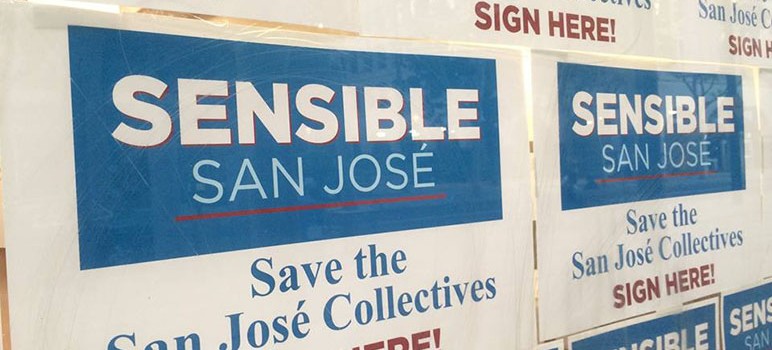An initiative that would repeal San Jose’s new medical marijuana regulations garnered enough signatures to make it to the ballot.
Now, the City Council has three choices: accept the initiative as is, push it to the general election in 2016 or hold a special election sometime sooner.
The proposed initiative spearheaded by a group called Sensible San Jose seeks to overturn the bulk of regulations enacted city leaders over the summer. San Jose’s new rules limit collectives to about 1 percent of the city and require all product to be grown and manufactured on-site.
The initiative would do away with distance requirements from schools, daycares and other “sensitive use” sites. Unlike the city’s program, the initiative wouldn’t allow the city to recover cost, according to a staff analysis ordered by Mayor Chuck Reed.
“I have grave concerns about this initiative,” Reed states in a September memo. “The proponents told those signing that it would protect children and neighborhoods, but as with any legislation, the devil is in the details.”
Some of those details include prohibiting the city from accepting federal funding to crack down on the local cannabis industry and requiring city officials to inspect a dispensary for compliance only if they provide reasonable notice. San Jose’s existing rules, adopted a few months ago, allow the city to inspect a facility at any time.
The initiative would allow delivery-only businesses, as opposed to city rules that require all marijuana sales to take place at a permitted pot club.
Fines would drop significantly under the initiative. The council recently adopted a fine schedule ranging from $2,500 to $50,000 for violations. The initiative proposes capping those at $100.
San Jose’s marijuana sector has shrunk dramatically with the passage of the city's new rules in June. Of the city’s 80 pot clubs, 47 have applied for zoning permits. Twenty were already denied, 20 are under review and six were approved. But they still have to be reviewed for compliance with the city’s new operational regulations.
Here's a side-by-side comparison of San Jose's newly enacted regulations and the changes proposed by the citizen-led initiative.
More from the San Jose City Council agenda for October 28, 2014:
- In a show of solidarity with the city’s Vietnamese community, the council will consider a resolution that would ban city leaders from meeting with any government officials from the Socialist Republic of Vietnam. San Jose has the largest Vietnamese population in the United States. “Many of our Vietnamese-American residents have fought and sacrificed for freedom an democracy in Vietnam, and have suffered from imprisonment and other hardships wrought by the oppressive government of Vietnam,” Mayor Chuck Reed and council members Madison Nguyen and Sam Liccardo state in a joint memo.
- The Santa Clara Valley Audobon Society is appealing a permit that would have allowed developers to lower some hills in south San Jose to make way for new single-family homes.
WHAT: City Council meets
WHEN: 1:30pm Tuesday
WHERE: City Hall, 200 E. Santa Clara St., San Jose
INFO: City Clerk, 408.535.1260


About the San Jose City Council agenda for October 28, 2014: Santa Clara Valley Audubon Society’s appeal addresses a process that :
a. Permitted a subdivision and development on land that was previously set aside and designated to remain open space in perpetuity, as mitigation for the development of Richmond Ranch
b. Permitting the “shaving” of a hill adjacent to this development. The hill was also set aside as open space to mitigate impacts of development, but is in the way of the development of the
Santa Clara Valley Audubon Society expects lands or other natural resources that are set aside to mitigate impacts to environmental resources to remain undeveloped. We do not want to see additional mitigation lands developed, or mitigation open space graded to allow a development on adjacent parcels.
This is the basis of our appeal
Well, let’s just pack dope in your kids lunch pale and be done with it.
Yes, reed, you have taught us well about the “devil” being in details.
I like the idea of distance requirements from schools, daycares and other “sensitive use” sites. As a matter of fact, why are Liquor stores not lumped into this initiative as well. Why do we not keep liquor stores or stores that sell liquor, beer and wine a distance requirement, same one imposed on Pot Dispensaries, from “sensitive use” sites and daycares and elementary, middle and High schools?
All 3 of my adult sons – 2 of whom have several advanced degrees – admit they started smoking pot at 11. There were NO pot clubs or any form of legality when they were 11 so this notion that medical mj laws have increased availability to kids is wrong – pot’s been widely available to kids for decades. Since the 60’s Mexican and Russian cartels have made sure the country is with high grade pot possibly grown with toxic chemicals – these people are the real enemy in the pot conversation. The cartels gotta LOVE people who want to keep pot illegal since it’s quite likely the for-real “richest man in the world” runs a cartel… Anyone who naively believes medical marijuana clubs are the problem is delusional. Pot clubs are exactly like liquor stores in that any “booze dispensary” who sells the hardest drug of all to kids – hard liquor – would risk losing their enormously profitable liquor license. Same with pot clubs so what dispensary owner would risk his official city approval the selling $20 bucks of weed to a kid? No way…there is no shortage of legal clients. Upon entry these clubs demand ID and verify your prescription is legit – even if the client is 50-60 years old. We simply need to attempt to teach our kids pot’s like whisky – not for kids – while recognizing they’ll probably do it anyway and, go figure, may still end up with a couple masters or law degrees… (like their parents)